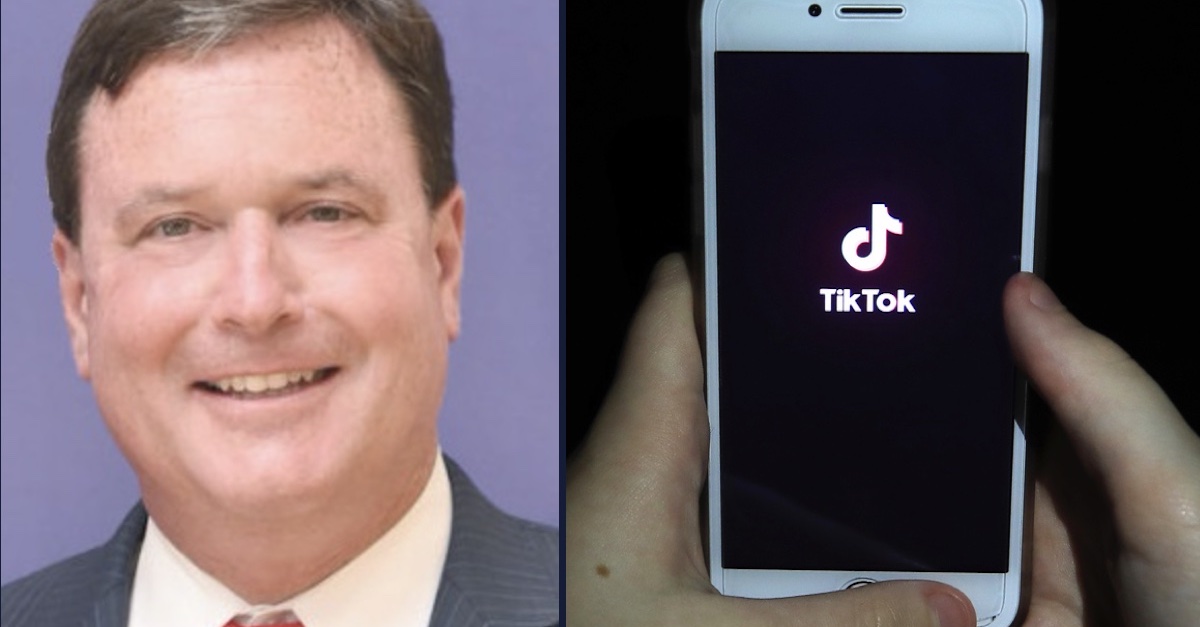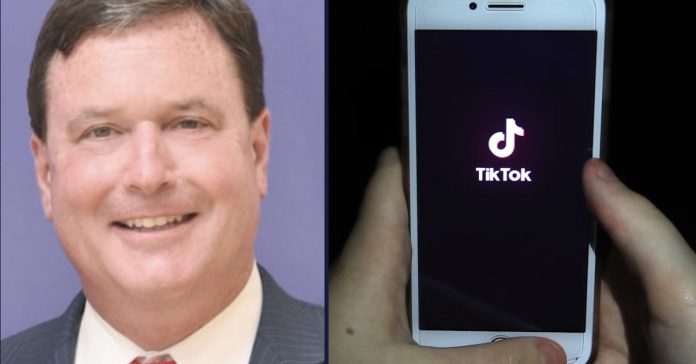
Indiana Attorney General Todd Rokita (left) in a photo from his office, a young TikTok user accessing the app on a smartphone (Press Association via AP Images)
Indiana Attorney General Todd Rokita’s (R) lawsuit against TikTok, which a federal judge once dinged for “irrelevant posturing,” fared no better in state court, as a judge on Wednesday tossed the case for multiple failures.
Judge Jennifer L. DeGroote of the Allen County Superior Court wrote in her dismissal order that Rokita’s lawsuit failed to establish jurisdiction and failed to state a claim under the Indiana Deceptive Consumer Sales Act.
When two TikTok suits (later consolidated into one case) were filed in early December 2022, AG Rokita said he was taking on a “malicious and menacing threat unleashed on unsuspecting Indiana consumers by a Chinese company that knows full well the harms it inflicts on users.”
“TikTok says its platform is all about spreading joy. But the more TikTok videos consumers view, and the more content that they create and share, the more TikTok learns about them — their interests, their locations, the types of phones they have, the apps on their phones, who their contacts are, their facial features, their voice prints, and even ‘where your eyes are looking on your phone,” the complaint said. “While TikTok vacuums up reams of this highly sensitive and personal information about Indiana consumers, it deceives and misleads them about the risks the app routinely poses to their data.”
In an accompanying statement, Rokita expressed “hope” that the suits would “force TikTok to stop its false, deceptive and misleading practices, which violate Indiana law.”
While that hope has been dashed, at least for now, Rokita’s office reportedly said it is evaluating a potential appeal.
The dismissal
In walking through the background of the case, Judge DeGroote referenced U.S. District Judge Holly Brady’s May remand of one lawsuit back to state court. Though Brady denied TikTok’s attempt to remove the case to federal court, she was not pleased with AG Rokita’s “irrelevant posturing.”
“This case was initiated by a fifty-one page, two hundred thirty-four paragraph, one hundred forty-one footnote complaint. Only fifteen paragraphs and two pages address Indiana’s actual legal claim,” Brady wrote at the time.
DeGroote noticed.
“On May 23, 2023, Judge Holly A. Brady from the United States District Court granted the State’s Motion to Remand the case back to the Allen Superior Court noting that the sole claim of the State against the Defendants was a violation of Indiana Deceptive Consumer Sales Act which was essentially buried in the 51 page, 234-paragraph Complaint,” the state judge wrote, noting that when the Rokita complaint was amended the number of pages actually increased to 56 even though the allegations “remained essentially the same.”
From there, DeGroote said that Rokita failed to establish specific jurisdiction in support of his claims that TikTok acted deceptively.
“The Amended Complaint does not allege that Defendants made any of their allegedly deceptive statements or omissions in Indiana, nor does it allege that those statements or omissions were specifically directed at Indiana users,” DeGroote said. “The statements and alleged omissions are found in multiple sources, all of which can be characterized as directed to the U.S. market as a whole. Some of these places include letters and testimony to legislators, interviews with news outlets, and statements on TikTok’s website.”
“While the Amended Complaint alleges that the TikTok platform is available to Hoosiers through third-party app stores, this is insufficient to establish specific jurisdiction because the State does not allege that TikTok specifically targeted Indiana,” the judge added [citations removed for easy of reading]. “Moreover, it is well-established that the unilateral act of a third party — such as a Hoosier downloading and using TikTok, or a third-party app store offering TikTok in Indiana — cannot establish specific jurisdiction.”
In summary, Rokita failed to show that Indiana citizens were uniquely targeted by TikTok’s “inappropriate content.”
“Indiana-focused content and advertisements have nothing to do with the State’s claims, which address nationally-directed statements. The State has not pled that this allegedly inappropriate content is targeted to Indiana residents in any manner different than it is to users in other states,” DeGroote wrote, ordering up a dismissal on the ground that she lacked specific jurisdiction over TikTok.
But wait, there’s more.
Rokita also failed to state a claim under the Indiana Deceptive Consumer Sales Act or DCSA, so that was “an additional independent ground for dismissal of the State’s Amended Complaint,” the judge said.
Why? Because the “downloading of the free TikTok app” neither fits the DCSA’s definition of a “consumer transaction” nor fits the historical way the DCSA has been applied.
“DCSA also defines a ‘consumer transaction’ as ‘a sale, lease, assignment, award by chance, or other disposition of an item of personal property, real property, a service, or an intangible,’” DeGroote continued. “The DCSA has historically been used for consumer transactions involving exchanges for money.”
“This Court finds that the DCSA definition of consumer transaction does not include the downloading of a free app. No consumers in indiana have exchanged money for their use of TikTok,” the judge summarized. “As the downloading of a free app is not a consumer transaction, the DCSA does not apply to this case.”
DeGroote concluded Rokita’s amended complaint “also fails” because it did not “allege TikTok made any deceptive acts or omissions ‘in connection with a consumer transaction,’ as the statute requires.”
Rather, TikTok’s “alleged misstatements and omissions regarding the risk of the Chinese Government accessing U.S. user data” were grounded in “(i) letters and testimony to legislators; (ii) interviews with news outlets; (iii) statements on TikTok’s website; (iv) generalized allegations regarding TikTok Inc.’s purported public-relations strategy; and (v) court filings.”
“There are no allegations that Indiana users even heard these alleged misstatements, let alone relied on them when deciding to download and use the TikTok platform,” DeGroote said. “In the absence of such allegations, the State has not asserted a claim under the DCSA and TikTok’s Motion to Dismiss shall be granted.”
Rokita’s argument that TikTok should be liable for not “alert[ing] Indiana consumers” in the company’s privacy policy to the “ability of TikTok to share their data with individuals or entities located in China, or for individuals or entities located in China to access that data,” also fell flat with the judge.
“Although the State faults the Privacy Policy for not specifically referencing ‘China,’ this allegation does not give rise to a claim under the DCSA,” DeGroote said.
The state judge, therefore, threw out the lawsuit without addressing, “at this time,” the additional “federal constitutional issues” that TikTok highlighted in its motion to dismiss.
On the same day as the TikTok case dismissal, Rokita’s office announced that the AG was heading a coalition of Republican attorneys general going to bat in a Colorado case for former President Donald Trump to remain on the 2024 ballot.
In a statement, Rokita said that the 14th Amendment insurrection clause bid to disqualify Trump from running for president again “smacks of the same underhanded sliminess that provoked such skepticism among Americans after the 2020 elections.”
In early November, the Indiana Supreme Court found Rokita “engaged in attorney misconduct” when, in July 2022, he went on Fox News and accused Caitlin Bernard — the doctor who performed an abortion on a 10-year-old rape victim who traveled from Ohio to the Hoosier State after the U.S. Supreme Court overturned Roe v. Wade — of being an “abortion activist acting as a doctor — with a history of failing to report.”
Those statements, among others, had “no substantial purpose other than to embarrass, delay, or burden a third person,” namely Bernard, the state high court said while approving a public reprimand of Rokita as discipline.
Notably, well before the disciplinary opinion, Rokita failed to strip Bernard of her medical license.
Have a tip we should know? [email protected]

